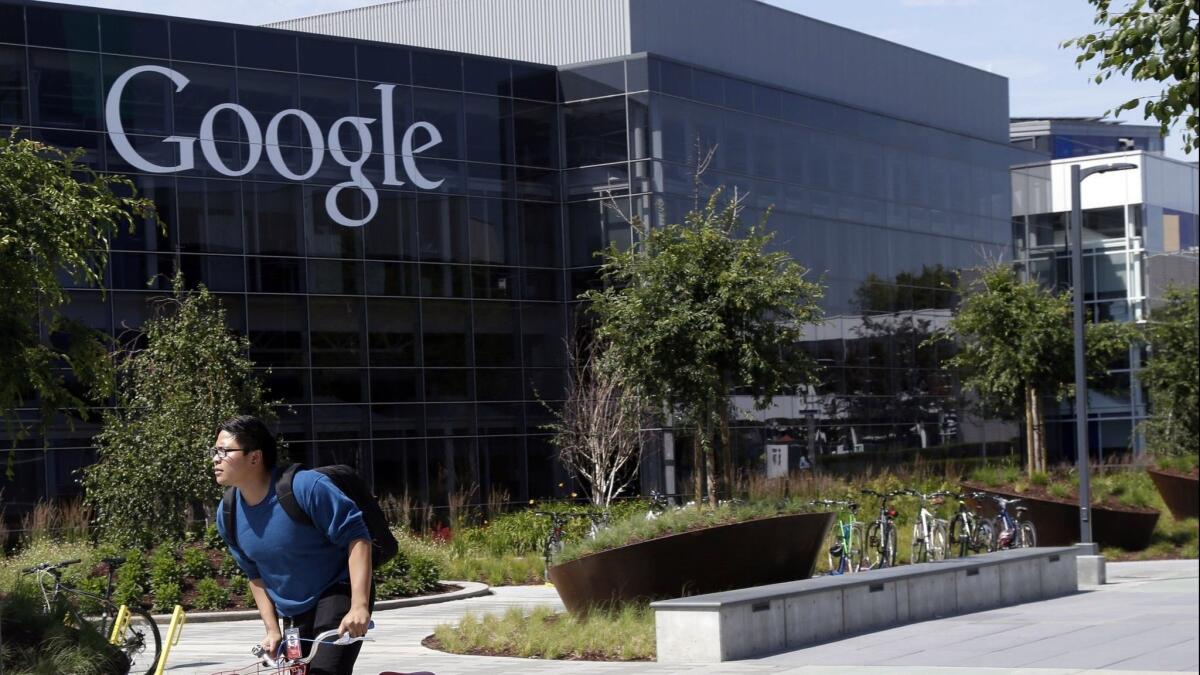Op-Ed: It’s time for the tech world to start giving back

- Share via
Secure-technology expert Bruce Schneier recently pointed out that the administration of Harvard Law School was upset to learn that only 20% of its graduating class was headed for public service. Yet at most top engineering schools, the proportion is pretty close to zero, and no one seems to have noticed.
That has to change, and quickly.
Engineering has come to dominate more and more facets of our social, political and financial lives, but it has left behind the concept that engineers have responsibility to the broader social good.
It is easy to see why. Until a few years ago, the vast majority of Americans would have agreed that technology was really just about science and engineering. Tech’s benefits were obvious when viewed through that that agnostic frame. Silicon Valley drove the economy, improved the balance of trade and epitomized progress.
To the degree that ethics were considered, they accrued primarily on the positive side of the ledger. Google democratized knowledge and Apple put NASA-level computing power in every pocket.
Engineering schools need to expand their requirements to include ethics and encourage engagement with the world.
The first cries of foul arose from industries in distress, recorded music and newspapers among them. Then a steady drumbeat began. Edward Snowden’s revelations opened a window on widespread government surveillance. We learned how, in Myanmar and other nations, social media was used to accelerate ethnic killings. We saw how, in the United States, a foreign government used technology to try to influence the outcome of the 2016 election.
The pre-Snowden belief that tech by itself would make the world better was over, and Silicon Valley’s pledge to bring everyone together has succeeded only by uniting the world against Silicon Valley.
So what needs to happen? One key step is embracing what Schneier and others call public service technology, a loose term that encompasses engineering done for the government and for nonprofits, as well as that produced by corporate employees donating some of their time for the greater good.
The seeds of change have already been planted.
The decade-old Code for America gives yearlong fellowships for technologists working to improve delivery of government services to those who need them most. And a few prominent charitable endowments have been ahead of the curve, promoting the idea of public interest tech in the same way that they drove the idea of public service in law schools during the 1970s. In 2015, a partnership called NetGain was established, which funded a report that called for more than two dozen philanthropic “interventions” such as scholarships, internships and boot camps to teach technologists about public interest needs.
Various tech billionaires are helping as well, including founders of EBay and Craigslist. WhatsApp co-founder Brian Acton, who had stayed at the messaging service after its purchase by Facebook, recently left to promote Signal, a secure encrypted service controlled by a nonprofit.
But so much more is needed, and it has to start with engineering schools promoting social responsibility the way law schools do — forgiving portions of loans for students choosing public service, giving course credit for projects that provide public benefit, providing examples of satisfying pathways to practicing high-level engineering while doing good for the world.
Every government agency needs the ingenuity and expertise of great engineers, as do a wide range of nonprofits, but the most talented and innovative engineers often don’t think to look to the public sector. In a world where teenagers in one country can shut down hospitals in another, the skills of great engineers are definitely needed beyond Silicon Valley.
The good news is that a few good engineers can accomplish a great deal, especially through open-source software. They did with Signal and with the Tor Project. Tor’s anonymity tool was prodded along by competing offerings from the pioneering hacktivists who called themselves the Cult of the Dead Cow. The group also provided the impetus for the creation of the interdisciplinary Citizen Lab at the University of Toronto, which steadily exposes government surveillance of activists.
Enter the Fray: First takes on the news of the minute »
Some higher education institutions are also moving forward, combining technology and public policy programs for joint degrees and other initiatives. In March, leaders of the nonprofit New America, Ford and Hewlett Foundations announced the creation of the Public Interest Technology University Network, starting with 21 campuses.
But as Silicon Valley likes to say, these efforts need to scale.
Engineering schools need to expand their requirements to include ethics and encourage engagement with the world. Professional technologist organizations should take a fresh and honest look at their terse ethical codes, reviewing them for their impact on society.
The big companies should grant employee leaves for public service. And those like Google that can afford to let workers spend 20% of their time on personal projects should expand that to include public service efforts for worthy proposals.
The legal profession recognized long ago that it would not be serving society if only the wealthy could afford lawyers. The medical profession knows that it must care for those who cannot pay.
It is past time for engineers to do their part as well.
Joseph Menn is author of “Cult of the Dead Cow: How the Original Hacking Supergroup Might Just Save the World” and a technology projects reporter at Reuters.
More to Read
A cure for the common opinion
Get thought-provoking perspectives with our weekly newsletter.
You may occasionally receive promotional content from the Los Angeles Times.









